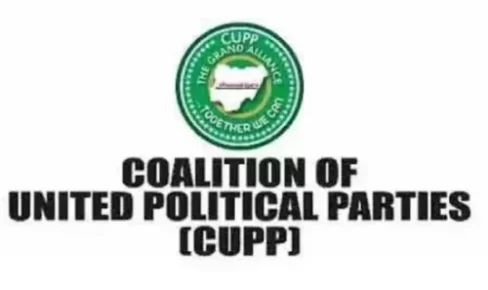Coalition of United Political Parties (CUPP) has said that Nigeria needs not limit the number of political parties in the country, pointing out that the idea of a multiparty democracy is not to limit the number of political parties to a particular number.
CUPP, while giving the stand, said this was due to fact that a political party thrives, survives, or submerges on the basis of its relevance, activities and the energy it was able to aggregate in the polity.
This was just as the coalition noted that what was experienced in the 2023 General Election was an indication that Nigeria needed more options aside the All Progressives Congress (APC) and Peoples Democratic Party (PDP) as it could be seen that the Labour Party (LP) gave the two biggest parties “a run for their monies.”
Spokesperson of the coalition, Comrade Mark Adebayo, made this assertion, while reacting to question from our correspondent, saying that even in advanced democracy like the United States (US) and the United Kingdom (UK), among others, several other fringe political parties were operating apart from the two main parties often known to many.
He disclosed that India, regarded as the largest democracy in the world today, “accommodates almost 3,000 political parties divided into national, regional and state parties depending on their relevance and capabilities,” with each operating at its level of capacity and influence.
According to him, the United Kingdom (UK) and Northern Ireland have over 400 political parties, saying that it the Conservative and Labour parties that dominate the political scene.
He argued that the development had to do with the philosophy behind multiparty democracies “because you cannot stop people from associating on the basis of ideological identity which they may not find in the so-called bigger parties.”
Comrade Adebayo, however, noted that the fear, especially in Nigeria is that the Independent National Electoral Commission (INEC) might find it difficult to manage too many political parties, maintaining that the authorities needed not limit the number of political parties or deregister them once registered, especially as government no longer funds them.
“The idea of a multiparty democracy is not to limit the number of political parties to a particular number. A political party thrives, survives, or submerges on the basis of its relevance, activities and the energy it is able to aggregate in the polity.
“For instance, since the 1850s, the American political space and elections have been dominated by two political parties; Democratic Party and Republican Party. But there are several other fringe political parties operating in the USA and even occasionally winning elections into the American Congress.
“The largest democracy in the world today, India, accommodates almost 3,000 political parties divided into national, regional and state parties depending on their relevance and capabilities. Each operates at its level of capacity and influence. You live or die on altar of political relevance, not by fiat,” he said.
“UK and Northern Ireland have over 400 political parties but it is the Conservative and Labour parties that dominate the political scene. That’s the philosophy behind multiparty democracies because you cannot stop people from associating on the basis of ideological identity which they may not find in the so-called bigger parties.
“The fear in Nigeria is that the election management body, in this case the Independent National Electoral Commission (INEC) might find it difficult to manage too many political parties. We don’t need to limit the number of political Parties or deregister political Parties once registered, especially as government no longer funds political parties,” he added.
According to the CUPP spokesperson, what the country needs to do rather than limiting the number of political parties is to set standards for registered parties to participate in different categories of elections, saying that if a party doesn’t meet the conditions to participate in the presidential election but meet the conditions set for local government election, it should then go ahead and participate at that level.
“By that, we have removed the menace of having Olympic-mentality parties and candidates clogging up our ballot papers. You know they say Olympics is just to participate and not necessarily to win. But we can only allow serious political parties who mean business to appear on the presidential, governorship and other ballots. By this, the parties would become more competitive and impactful and you have a tidier electoral processes.
“Truth be told, Nigerians need more options with regard to political parties than the current leading parties that Nigerians are fed up with. You can see that Labour Party gave the two biggest parties, APC and PDP, a run for their monies in 2023,” Adebayo said.
“That’s to tell you that party politics in Nigeria is evolving and you never can tell which party will come on the scene and revolutionise the whole process of national development by taking Nigeria to its promised land.
“We believe that the right to association that evolves into political parties should never be restricted, just set standards and any party that doesn’t meet up should not be allowed to participate without being deregistered. Deregistration of political parties is undemocratic, draconian and unconstitutional in a system of multiparty democracy,” he added.
